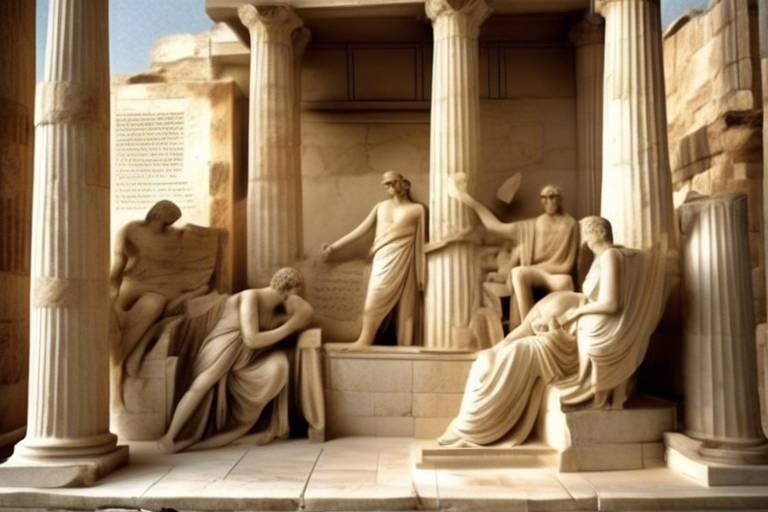How Ancient Philosophies Shape Modern Thought
Ancient philosophies hold a timeless allure, their wisdom transcending the boundaries of time to shape the very fabric of modern thought. These age-old teachings, rooted in the insights of revered thinkers from bygone eras, continue to resonate with contemporary minds, offering profound insights and guiding principles that influence our perspectives and behaviors today.

Foundational Principles of Stoicism
Stoicism, founded in ancient Greece by Zeno of Citium in the 3rd century BC, is a philosophical school of thought that has left a lasting impact on contemporary attitudes and behaviors. At the core of Stoicism lies the belief in focusing on what is within our control and accepting what is not. This foundational principle emphasizes the importance of cultivating resilience in the face of adversity and maintaining a sense of inner peace amidst external chaos.
Stoicism teaches individuals to practice self-discipline, rationality, and virtue in their daily lives. By prioritizing personal growth and moral integrity, Stoics aim to live in accordance with nature and uphold a sense of duty towards the greater good. The philosophy encourages individuals to embrace challenges as opportunities for growth and to approach life with a mindset of equanimity and tranquility.
Furthermore, Stoicism emphasizes the transient nature of external circumstances and advocates for detachment from material possessions and societal expectations. By focusing on internal virtues such as wisdom, courage, justice, and moderation, Stoics strive to achieve a state of eudaimonia, or flourishing, through aligning their actions with their values and principles.
The Stoic philosophy's enduring relevance in the modern world lies in its practical approach to navigating life's uncertainties and complexities. By promoting a mindset of acceptance, resilience, and ethical living, Stoicism continues to offer valuable insights into how individuals can lead meaningful and fulfilling lives despite the challenges they may face.

Daoist Philosophy and Balance
Daoist philosophy, rooted in ancient Chinese wisdom, revolves around the concept of balance and harmony in all aspects of life. The Daoist belief in the interconnectedness of nature and society underscores the importance of maintaining equilibrium to achieve well-being and sustainability. This philosophy emphasizes the need to align oneself with the natural flow of existence, rather than resisting or disrupting it. Just as a tree bends with the wind to avoid breaking, Daoism teaches us to adapt and find balance in the face of challenges.
By observing the cyclical patterns of nature and the fluidity of change, Daoist philosophy encourages individuals to embrace the ebb and flow of life with grace and acceptance. The principle of yin and yang symbolizes the complementary forces of the universe, illustrating how opposing elements are interconnected and interdependent. In modern times, this concept of balance has found resonance in movements promoting sustainable living, holistic well-being, and environmental conservation.
Applying Daoist principles to daily life involves cultivating mindfulness, simplicity, and moderation. By attuning ourselves to the rhythms of nature and fostering inner harmony, we can navigate the complexities of modern existence with greater ease and clarity. The Daoist emphasis on living in harmony with both the external world and our inner selves offers a timeless guide for achieving balance and fulfillment in a fast-paced and often chaotic world.

Aristotelian Ethics in the Digital Age
Aristotelian ethics, rooted in the philosophical teachings of Aristotle, offer profound insights into moral character and virtuous living, even in the fast-paced realm of the digital age. In a world where technology shapes our interactions and ethical considerations, the timeless principles of Aristotelian ethics serve as a guiding light, illuminating the path towards ethical decision-making and personal integrity.
Central to Aristotelian ethics is the concept of virtue ethics, emphasizing the development of moral virtues through habitual practice and conscious choice. In the digital landscape filled with ethical challenges, cultivating virtues such as honesty, integrity, and compassion becomes essential for navigating the complexities of online communication, privacy, and information sharing.
Moreover, Aristotle's emphasis on practical wisdom (phronesis) resonates deeply in the digital age, where individuals are constantly faced with moral dilemmas in their online interactions. The ability to discern right from wrong, to act ethically in the face of digital temptations, and to make sound judgments in the virtual realm reflects the essence of Aristotelian ethics.
As social media platforms and digital technologies continue to shape our ethical landscapes, the Aristotelian notion of eudaimonia (human flourishing) offers a compelling framework for evaluating the impact of our digital choices on personal well-being and societal harmony. Striving for eudaimonia in the digital age involves not only seeking individual happiness but also contributing to the common good and fostering a virtuous online community.
In conclusion, Aristotelian ethics provide a timeless ethical compass that guides individuals in navigating the complexities of the digital age with moral responsibility, integrity, and a commitment to virtue. By integrating Aristotelian principles into our digital interactions and ethical decision-making processes, we can uphold ethical standards, promote human flourishing, and cultivate a culture of integrity and respect in the digital realm.

Confucian Values in Contemporary Society
Confucian values have long been ingrained in the fabric of Asian societies, influencing interpersonal relationships, societal norms, and ethical standards. In contemporary society, the principles espoused by Confucius continue to hold relevance and shape various aspects of modern life. One of the central tenets of Confucianism is the importance of filial piety, emphasizing respect for parents and ancestors. This value is reflected in the strong emphasis on family ties and the honoring of elders in many Asian cultures.
Furthermore, the concept of social harmony, another key aspect of Confucian thought, plays a significant role in shaping societal structures and interactions. The emphasis on maintaining harmonious relationships, fostering a sense of community, and prioritizing the greater good over individual interests aligns with the idea of collective well-being prevalent in many Asian communities.
Moreover, the emphasis on education and the pursuit of knowledge in Confucian philosophy has had a lasting impact on modern educational systems. The focus on moral education, character development, and the cultivation of virtues echoes in contemporary approaches to holistic education that aim to nurture not only intellectual abilities but also ethical values and social responsibility.
Confucian values also influence business practices and leadership styles in Asian countries, emphasizing the importance of integrity, trustworthiness, and ethical conduct in professional settings. The principles of loyalty, honesty, and benevolence advocated by Confucius continue to guide ethical decision-making and interpersonal relationships in the corporate world.
In essence, the enduring influence of Confucian values in contemporary society underscores the timeless wisdom of Confucius and highlights the continued relevance of his teachings in shaping ethical behavior, social interactions, and cultural norms in the modern world.

Platonic Ideals in Education
Plato's philosophy of education, rooted in his dialogues like "The Republic," continues to influence modern educational systems with its emphasis on the pursuit of knowledge, critical thinking, and the cultivation of intellectual virtues. Just as Plato believed in the importance of developing the mind and soul through education, contemporary educators strive to instill a love of learning and a sense of curiosity in students. The Platonic ideals of seeking truth, engaging in dialectical reasoning, and fostering a well-rounded intellectual development echo in the core principles of many educational institutions today.
Plato envisioned education as a transformative process that leads individuals out of the darkness of ignorance into the light of knowledge. This metaphorical journey of enlightenment mirrors the modern educational goal of empowering students to think critically, question assumptions, and engage with diverse perspectives. By encouraging students to explore ideas beyond surface-level understanding, educators aim to cultivate a deeper appreciation for the complexities of the world and inspire a lifelong commitment to learning.
Central to Plato's educational philosophy is the concept of the "philosopher-king," an ideal ruler who possesses both intellectual wisdom and moral integrity. While the practical application of this concept may vary in contemporary society, the underlying message of combining intellectual prowess with ethical responsibility remains relevant. Educators today strive not only to impart knowledge but also to nurture ethical values, empathy, and social consciousness in their students, echoing Plato's vision of education as a means to create virtuous individuals who contribute positively to society.
Plato's emphasis on the holistic development of individuals, encompassing intellectual, moral, and physical aspects, resonates with modern educational approaches that prioritize the well-being and growth of the whole person. By recognizing the interconnectedness of mind, body, and spirit, educators seek to create learning environments that support students' emotional and psychological development alongside their intellectual pursuits. The integration of holistic practices such as mindfulness, emotional intelligence training, and character education reflects a contemporary interpretation of Plato's belief in the importance of nurturing the complete individual.

Buddhist Mindfulness and Mental Health
Buddhist mindfulness practices have gained significant recognition in the field of mental health for their profound impact on emotional well-being and stress management. The integration of mindfulness meditation techniques rooted in Buddhist philosophy has provided individuals with practical tools to navigate the complexities of modern life while fostering inner peace and resilience.
By cultivating a non-judgmental awareness of the present moment, individuals can develop a deeper understanding of their thoughts and emotions, leading to enhanced self-regulation and emotional stability. This practice of mindfulness encourages individuals to observe their thoughts without attachment, promoting a sense of clarity and mental equilibrium.
Moreover, mindfulness meditation has been shown to reduce symptoms of anxiety, depression, and chronic stress by promoting relaxation and fostering a positive outlook on life. Through regular practice, individuals can rewire their brains to respond to challenges with greater composure and adaptability, ultimately improving their overall mental health and well-being.
The incorporation of Buddhist mindfulness principles into therapeutic interventions has revolutionized the approach to mental health treatment, offering individuals a holistic and sustainable way to address psychological distress and promote emotional resilience. By embracing the transformative power of mindfulness, individuals can embark on a journey towards self-discovery, inner peace, and emotional healing.

Kantian Ethics and Moral Responsibility
Exploring the enduring influence of ancient philosophies on contemporary thinking and behavior, highlighting the relevance of historical wisdom in shaping modern perspectives and ideologies.
Delving into the core tenets of Stoicism and its impact on present-day attitudes towards adversity, resilience, and personal growth.
Examining the Daoist concept of balance and harmony in nature and society, and its reflection in modern approaches to sustainable living and holistic well-being.
Analyzing how Aristotelian ethics, focusing on virtues and moral character, can offer guidance in navigating ethical dilemmas posed by technology and social media.
Exploring the enduring influence of Confucian values such as filial piety, respect for elders, and social harmony on modern interpersonal relationships and societal structures.
Discussing the enduring relevance of Plato's philosophy of education, emphasizing the pursuit of knowledge, critical thinking, and the cultivation of intellectual virtues in modern educational systems.
Investigating the integration of Buddhist mindfulness practices in contemporary mental health treatments, highlighting the benefits of mindfulness meditation in managing stress and promoting emotional well-being.
Examining Immanuel Kant's categorical imperative and its implications for moral decision-making in complex ethical dilemmas, shedding light on the concept of moral responsibility in the modern world.
Tracing the influence of Hellenistic philosophies, particularly the Stoic and Epicurean schools, on the development of existentialist thought, exploring themes of freedom, authenticity, and the search for meaning in contemporary existential philosophy.

Hellenistic Influence on Existentialism
When delving into the realm of existentialism, one cannot overlook the profound influence of Hellenistic philosophies on shaping its core principles and themes. The existentialist movement, with its focus on individual freedom, authenticity, and the search for meaning in a seemingly indifferent universe, draws significant inspiration from the Stoic and Epicurean schools of thought that emerged during the Hellenistic period.
The Stoics, known for their emphasis on self-control, rationality, and acceptance of the natural order, laid the groundwork for existentialist ideas of personal responsibility and resilience in the face of adversity. The concept of living in accordance with nature, as advocated by Stoicism, resonates with existentialist notions of creating one's own meaning in a chaotic world.
Similarly, the Epicureans, who prioritized pleasure, tranquility, and the pursuit of a simple life free from unnecessary desires, contributed to existentialist reflections on the pursuit of happiness, inner peace, and the rejection of societal norms that hinder genuine fulfillment.
Existentialist thinkers like Jean-Paul Sartre and Albert Camus were deeply influenced by the philosophical inquiries of their Hellenistic predecessors, integrating their ideas into a modern context marked by the complexities of the 20th century. The existentialist quest for authenticity, the exploration of individual identity, and the confrontation of the absurdity of existence all bear traces of the Hellenistic philosophical heritage.
By tracing the lineage of existentialist thought back to the Hellenistic era, we gain a deeper appreciation for the enduring relevance of ancient philosophies in shaping our contemporary understanding of existence, freedom, and the perpetual quest for meaning in a world fraught with uncertainty.
Frequently Asked Questions
- What is the significance of ancient philosophies in modern thought?
Ancient philosophies serve as foundational pillars that shape contemporary thinking and behavior, offering timeless wisdom that remains relevant in today's world. By understanding the principles and teachings of ancient philosophies, individuals can gain insights into navigating the complexities of modern life and enhancing personal growth.
- How can Stoicism influence attitudes towards adversity and resilience?
Stoicism emphasizes the importance of accepting things beyond our control and focusing on what we can change, fostering resilience in the face of challenges. By embracing Stoic principles, individuals can cultivate a mindset of strength and perseverance, enabling them to navigate adversity with grace and fortitude.
- What role does Daoist philosophy play in promoting balance and harmony?
Daoist philosophy emphasizes the interconnectedness of all things and the pursuit of balance and harmony in nature and society. By embracing Daoist principles, individuals can strive for equilibrium in their lives, fostering holistic well-being and sustainable living practices that promote harmony with the world around them.
- How do Confucian values influence modern societal structures?
Confucian values such as respect for elders, filial piety, and social harmony continue to shape interpersonal relationships and societal norms in contemporary society. By upholding these values, individuals can contribute to the cultivation of a harmonious and respectful social environment that values tradition and community bonds.



















